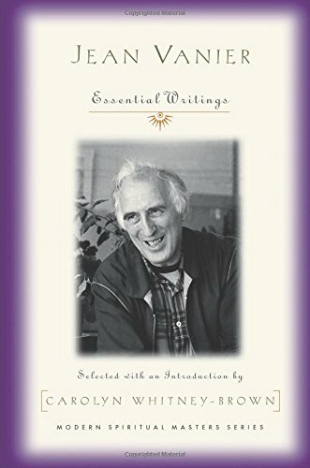In 1964, Jean Vanier, a 36-year-old Canadian former naval officer moved in with two men with intellectual disabilities who had been living in an institution. Their home became the first L'Arche community. It was followed by 132 communities in more than 34 countries, welcoming people of all faiths and traditions. Vanier, with many years of perspective has stated:
"We are healed by the poor and the weak, that we are transformed by them if we enter into relationship with them, that the weak and the vulnerable have a gift to give to our world. They call us together, in unity and peace, to build community."
In her introduction to this paperback in the Modern Spiritual Masters Series, editor Carolyn Whitney-Brown, a member of the L'Arche Daybreak Community in Canada from 1970 to 1997, provides a sturdy and substantive overview of Vanier's life and work. He is a dedicated Catholic layperson, spiritual leader, and philosopher. He left a career in the Navy and taught before founding L'Arche. "People with disabilities have called forth the child in me. They have taught us all in L'Arche how to rest in love and mutual caring, how to celebrate life and also celebrate death, to speak about death, to accompany people who are dying."
Vanier's books have been the outgrowth of retreats, lectures, public letters written to various communities, and extended treatments of themes which interest him. In some of these works, the text is broken into phrases and spaced similar to poetry; the author calls this distinctive style "meditative prose." Vanier says: "Change the world, with love, one heart at a time." This collection of his writings is divided into sections on transformation of society, transformation through community, transformation of the individual person and the Christian Life with material on prayer, retreat, and the spiritual life.
Here is a sampler of Vanier's writings:
• "Hope for our world lies not
in the manufacture of greater weapons
or the implementation of more repressive laws;
hope lies in our capacity to love and to forgive
and in our desire to live reconciliation
and to grow in love for our enemies."
• "This openness to and respect for others implies a belief
in our common humanity,
in the beauty of other cultures,
and in God's love for each person.
We are one human race.
We human beings are all fundamentally the same.
We are all people with vulnerable hearts,
yearning to love and be loved and valued."
• "My hope is that more and more people will discover that the peace we all yearn for is not just the work of governments but the task of each one of us. We can all become makers of peace. We can do our part. The future of the world is in the hands of each of us, and it depends on our commitment together with others for peace, each according to our own gifts and responsibilities. Peace is not a question of stopping this or that catastrophe, but of rediscovering a vision, a path of hope for all of humanity."
